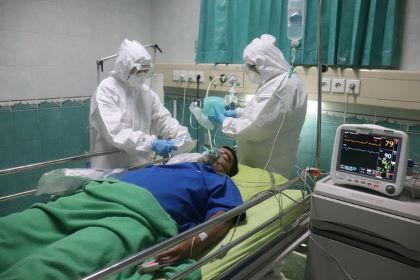Inflammation and blood clotting seen in very severe cases of Covid-19 may be caused by the antibodies sent to fight the disease activating unnecessary platelet activity in the lungs.
A new paper published in the journal Blood reveals how antibodies produced by our bodies to protect against Covid-19 are triggering increased function of platelets, which may cause severe blood clotting in patients with severe disease (Bye et al., 2021). Platelets are small cells found in the blood that form clots to stop or prevent bleeding, but where platelets don’t function properly, they can lead to serious health concerns such as strokes and heart attacks.
The study took antibodies produced to fight the coronavirus’s spike protein from people with severe Covid-19 infections and cloned them in a lab to study. The team found that the small sugars found on the surface of these antibodies were different from antibodies collected from healthy individuals. When those cloned antibodies were introduced in a lab to blood cells taken from healthy donors, there was an observed increase in platelet activity.
The study team also found that it was possible to reduce or stop platelets from responding in this way in the laboratory by treating blood with active ingredients from different medications, which can either inhibit platelet function or immune responses. The findings suggest that it may be possible for drugs that are currently used to treat immune system problems to reduce or stop the cells from producing an exaggerated platelet response.
A trial led by Imperial College London and Imperial College Healthcare NHS Trust – called MATIS – is already testing these drugs in clinical trials with patients at hospital sites across the UK to see whether they will reduce severe clotting for hospitalized Covid-19 patients.
The lab-based study of human cells provides key evidence to support the scientific basis for the MATIS trial. While there are yet to be any results reported from this clinical trial, the two teams will continue to work closely together as the clinical trial develops.
Professor Jon Gibbins, Director of the Institute for Cardiovascular and Metabolic Research at the University of Reading, said:
“Until now, we have only had assumptions about why platelets involved in clotting were being activated during Covid-19 infection.

“One way to think of what is happens is that the immune response that is designed to protect you from the infection in some cases, particularly in severely ill patients, actually causes more damage. In this case, the antibodies that are produced to stop Covid-19 from spreading trigger the infected cells to induce platelet activity which causes clotting even though no wound needs healing.
“We are particularly excited because our studies of platelets in the laboratory establish important mechanisms that explain how and why dangerous blood clots may occur in severely ill Covid-19 patients, and importantly, also provides clues as to how this may be prevented.”
Co-author Nichola Cooper, a reader at Imperial College London and consultant hematologist at Imperial College Healthcare NHS Trust, who also designed and leads the MATIS trial, said:
“Early on in the Covid-19 pandemic, it was clear that the infection was causing an overwhelming immune response, including blood clotting, and that many of the more severe cases and deaths were related to this.”
“Having been involved in early research around blood clotting related to inflammation, it occurred to me that the drugs we already use for other disorders could be easily accessible treatments for Covid-19.”
“We are yet to see results from the MATIS trial, so we do not yet know how these drugs will work in patients, but we hope to both inhibit the inflammatory response and prevent severe disease and blood clots. It is exciting to see our collaboration with Reading backing our theory already and providing a solid scientific basis for clinical trials.”
















